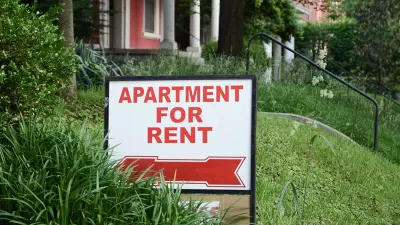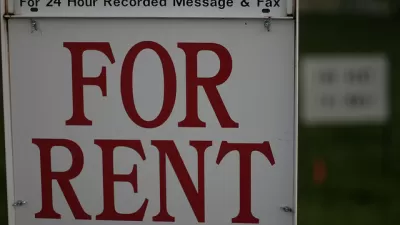A new Harvard study reports that the rental market began to decline this year, and may continue to drop as higher income renters become homeowners. However, the report was released a week before the GOP tax cuts bill was signed.

"According to a new report from the Harvard Joint Center for Housing Studies, the number and share of Americans who rent their homes have appeared to decline in 2017 for the first time since 2004," a 12-year stretch, reports Henry Grabar of Slate via Business Insider on Dec. 23. [See Planetizen post on the report.]
It’s hard to appreciate the scale of that decade-plus surge, which began in 2004, jumped as homeownership struggled during the foreclosure crisis, and didn’t slow down as a lack of new construction during and after the recession helped housing markets recover more quickly than wages. The homeownership rate hit a 50-year low in 2016 [62.9 percent, after peaking in 2004 at 69.2 percent].
"The impact of 10 million new tenant households in the last 10 years" has been felt the most on low-income renters, adds Grabar, because "about 60 percent of the growth in rental households since 2006 has occurred in households making more than $50,000," according to the report. While that's below the real median household income of $59,039 in 2016, renter income is significantly lower.
"The median income for rent-occupied households was $31,888" in 2012, according to the National Association of Home Builders. "The median income for owner-occupied households was more than twice that amount at $65,514."
"While rents have abated slightly in the past two years, nearly half of rental households pay more than 30 percent of their income in rent, and the rate is much higher in high-cost states and the nation’s largest cities," adds Grabar. That's why he calls the 12-year rental market surge a "high-income phenomenon."
In short: The foreclosure crisis dumped a lot of high earners who have traditionally bought homes into the rental market. Rapidly rebounding housing markets, with skyrocketing home prices in big cities, kept them there. Now the number of renters has reached a plateau.
==================================================================================================================
A week after the Harvard housing report was released, President Trump signed H.R. 1, the Tax Cuts and Jobs Act, which has the potential to throw a wrench into the housing and rental markets. With a reduction in the mortgage interest deduction, capping state, local, and property tax deductions at $10,000, and doubling the standard deduction which will reduce the number of filers who itemize their taxes, the incentive to purchase homes may be seriously curtailed,
On the other hand, the tax changes will also reduce home prices "[f]or roughly 80% of counties in the country," according to Moody's Analytics, reports The Wall Street Journal's housing correspondent, Laura Kusisto, on Dec. 24.
Should the tax bill reverse the recent downward trend in the rental market, bringing no relief for current renters, there is still a silver lining, remarks Grabar. It "could push to reshape a local and national political structure that has long favored homeownership as not only an economic goal but the mark of a good citizen."
And that change, ultimately, might be even better.
Hat tip to Peter Flieg.
FULL STORY: America's great renter boom is over

Trump Administration Could Effectively End Housing Voucher Program
Federal officials are eyeing major cuts to the Section 8 program that helps millions of low-income households pay rent.

Planetizen Federal Action Tracker
A weekly monitor of how Trump’s orders and actions are impacting planners and planning in America.

Ken Jennings Launches Transit Web Series
The Jeopardy champ wants you to ride public transit.

When Borders Blur: Regional Collaboration in Action
As regional challenges outgrow city boundaries, “When Borders Blur” explores how cross-jurisdictional collaboration can drive smarter, more resilient urban planning, sharing real-world lessons from thriving partnerships across North America.

Philadelphia Is Expanding its Network of Roundabouts
Roundabouts are widely shown to decrease traffic speed, reduce congestion, and improve efficiency.

Why Bike Lanes Are Good: An Explainer for the US Transportation Secretary
Sean Duffy says there’s no evidence that bike lanes have benefits. Streetsblog — and federal agencies’ own data — beg to differ.
Urban Design for Planners 1: Software Tools
This six-course series explores essential urban design concepts using open source software and equips planners with the tools they need to participate fully in the urban design process.
Planning for Universal Design
Learn the tools for implementing Universal Design in planning regulations.
Ada County Highway District
Clanton & Associates, Inc.
Jessamine County Fiscal Court
Institute for Housing and Urban Development Studies (IHS)
City of Grandview
Harvard GSD Executive Education
Toledo-Lucas County Plan Commissions
Salt Lake City
NYU Wagner Graduate School of Public Service





























